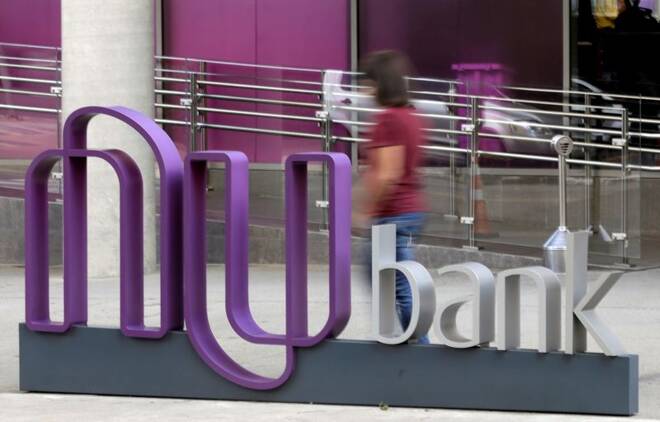Advertisement
Advertisement
Brazil’s Nubank slashes IPO valuation target to about $40 billion
By:
(Reuters) - Nubank on Tuesday cut the expected price range of its U.S. initial public offering, reducing the Brazilian online lender's targeted valuation by nearly $10 billion to up to $41.5 billion.
(Reuters) -Brazilian digital bank Nu Holdings slashed the targeted price range for its U.S. stock market flotation by about 18% on Tuesday, to roughly $40 billion, as a recent global sell-off in technology stocks weighs on year-end initial public offerings.
The company, known as Nubank, had earlier aimed for an IPO valuation of more than $50 billion on the back of a record-breaking boom in U.S. capital markets.
But a recent rise in Treasury yields has dampened investor sentiment toward major tech stocks, while the new coronavirus variant, Omicron, has raised fears of fresh damage from the almost two-year-long pandemic.
In a statement on its blog, Nubank said it decided to trim its price range to align with current market conditions. “Our focus is and has always been in the long term. For this reason, we sought to set a price range in line with markets at this moment.”
In an amended filing with the U.S. securities regulator, Sao Paulo-based Nubank said it now planned to sell about 289.2 million shares priced between $8 and $9 each. At the top end of the range, it would raise $2.6 billion at a valuation of $41.5 billion.
Affiliates of Sequoia Capital, Tiger Global Management, SoftBank Latin America Funds, Dragoneer, TCV, Sands Capital, Morgan Stanley and JPMorgan are expected to anchor the IPO and buy shares worth at least $1.3 billion, Nubank said.
Backed by Warren Buffett’s Berkshire Hathaway Inc, the company had earlier planned to raise nearly $3 billion by selling shares priced between $10 and $11 apiece.
Even at the lowered target valuation, Nubank would be worth more than Brazil’s largest traditional lender, Itau Unibanco Holding SA, which has a market capitalization of $37.5 billion.
The digital bank’s planned stock market float comes on the heels of several big U.S. IPOs in 2021, including fintech heavyweights like Robinhood Markets Inc and Coinbase Inc.
Investors, however, have been wary of backing Latin American fintech companies with questionable business models after Brazilian payments firm StoneCo posted hefty losses in its most recent quarterly results. StoneCo shares have declined more than 80% this year.
Nubank was founded in 2013 by David Velez, a Stanford-educated Colombian, as an issuer of credit cards that charged no annual fee. The company said last month it had managed to turn a profit in the first half of 2021 in its Brazilian operations.
Morgan Stanley, Goldman Sachs, Citigroup and NuInvest are the lead underwriters for Nubank’s offering.
(Reporting by Niket Nishant, Noor Zainab Hussain in Bengaluru and Carolina Mandl in Sao Paulo; Editing by Shailesh Kuber and Aditya Soni)
About the Author
Reuterscontributor
Reuters, the news and media division of Thomson Reuters, is the world’s largest international multimedia news provider reaching more than one billion people every day. Reuters provides trusted business, financial, national, and international news to professionals via Thomson Reuters desktops, the world's media organizations, and directly to consumers at Reuters.com and via Reuters TV. Learn more about Thomson Reuters products:
Did you find this article useful?
Latest news and analysis
Advertisement
